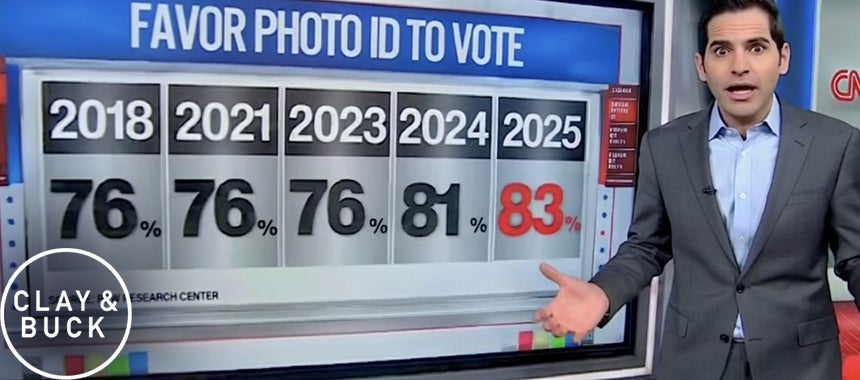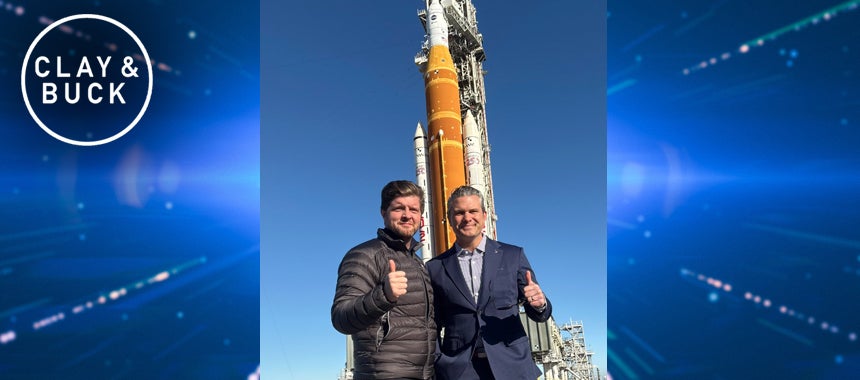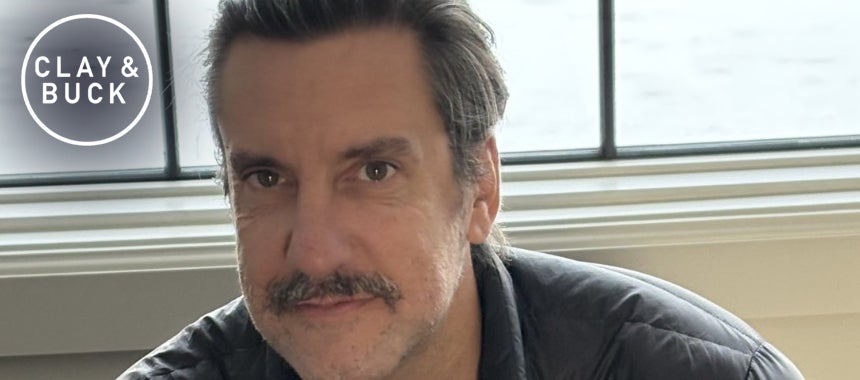Former Marine and Author Chad Robichaux Talks “Saving Aziz”
18 Jan 2023
CLAY: We’re joined now by Chad Robichaux, former Force Recon Marine and Aziz — an interpreter he rescued from Afghanistan — inspiring a new book, Saving Aziz: How the Mission to Help One Became a Calling to Rescue Thousands from the Taliban. Also, Save Our Allies has been founded by Chad, a nonprofit that evacuated 17,000 people from Afghanistan. Currently operates in Ukraine as well. Chad and Aziz are in our New York City studio right now. We appreciate you guys being here. And, Chad, I will start with you. Many people, I think, have forgotten about the chaos that came with our evacuation from Afghanistan. But since we left there, there are reports that thousands of people who have connections to America — who’ve worked for American soldiers — are still stuck behind in Afghanistan. What have you seen and what can you tell us about the situation on the ground in Afghanistan right now?
If you haven’t, pre-order your copy of my #1 New Release #SavingAziz. This book outlines the calling I had to rescue my long-time interpreter Aziz and his family from Afghanistan following the US withdrawal last August 2021.
Go to https://t.co/DdjLKfZGWe to order your copy now!! pic.twitter.com/zYwPMEYY5J
— Chad Robichaux (@ChadRobo) December 15, 2022
ROBICHAUX: Yeah, unfortunately, I don’t believe this is… Not by accident that it’s been not just forgotten but swept under the rug and the mainstream media has really been reluctant to report on it. And I think the White House has done everything they could to hide this story. We still have 75,000 of our interpreters that are qualified for SIV, Special Immigrant Visa, program and not only qualify, but were promised by our government for their service to us for 20 years. They’re still in Afghanistan as well as other lily pad countries around the world.
In addition to that, we have their family members and each of them are vulnerable. You’re talking about 300,000 people that have served the American effort in Afghanistan and all of them are vulnerable. They’re being systematically hunted down, pulled out of their homes at night, beaten, tortured, killed, and executed for their service to our country. And, you know, we have a State Department is refusing to acknowledge it and to do the right thing. And it’s still happening every day.
 And meanwhile, you know, we have 40 million Afghan residents, 20 million women that are being sexually enslaved, dealing with, you know, Sharia law. Not the Taliban 2.0, but the same old brutal, you know, Daesh terrorists that they are who are who are marrying off 9-year-old girls and 11-year-old girls for a few hundred bucks, taking advantage of the… They’re starving their people to make them desperate, who just last week took away women’s medical rights by saying that women are allowed to see male doctors, but they’re not allowed to be doctors. They’re not allowed to be educated, and so the whole thing is just terrible. And the fact that the White House has done such an effective job of making this go away is more the reason why I want this book out, Saving Aziz, so people know the truth.
And meanwhile, you know, we have 40 million Afghan residents, 20 million women that are being sexually enslaved, dealing with, you know, Sharia law. Not the Taliban 2.0, but the same old brutal, you know, Daesh terrorists that they are who are who are marrying off 9-year-old girls and 11-year-old girls for a few hundred bucks, taking advantage of the… They’re starving their people to make them desperate, who just last week took away women’s medical rights by saying that women are allowed to see male doctors, but they’re not allowed to be doctors. They’re not allowed to be educated, and so the whole thing is just terrible. And the fact that the White House has done such an effective job of making this go away is more the reason why I want this book out, Saving Aziz, so people know the truth.
BUCK: Hey, Chad, it’s Buck. Really appreciate you joining us. And thank you for your service, sir. What would you like to see the Biden administration do? I mean, if you could get a sit down with Biden and, you know, top national security apparatus folks, what do you think is the path forward if they were to get serious and engage on this issue and keep the word of the American government that was given to those who were helping people like you who were serving our country in uniform in Afghanistan?
 ROBICHAUX: Yeah, look, it’s a really good question. You know, first of all, you’re not asking a question; it goes in hindsight. But I have to say, the American people were lied to and said that that we were in a 20-year war. “We’re in an endless war. We have to end this war; we have to get out,” and I think everyone really believed that. But the truth is that that’s a lie. And it’s not consistent with historical successes of military strategy in the United States. We had 2,500 troops to 4,000 troops in Afghanistan and in 2018, we stopped participating in a conventional fight against Taliban, and we started a support-and-advisory role with the Afghan National Army and Afghan National Police.
ROBICHAUX: Yeah, look, it’s a really good question. You know, first of all, you’re not asking a question; it goes in hindsight. But I have to say, the American people were lied to and said that that we were in a 20-year war. “We’re in an endless war. We have to end this war; we have to get out,” and I think everyone really believed that. But the truth is that that’s a lie. And it’s not consistent with historical successes of military strategy in the United States. We had 2,500 troops to 4,000 troops in Afghanistan and in 2018, we stopped participating in a conventional fight against Taliban, and we started a support-and-advisory role with the Afghan National Army and Afghan National Police.
And the entire international community was participating at Bagram Air Force Base — the most strategic place in the globe between Iraq, Iran, Russia, and China — and for us to give that up, for saying we have to move out 20,000 of our 104,000 troops. Meanwhile, we have 80,000 troops in Japan and 40,000 troops in Germany since World War Two, with 35 troops in South Korea since World War Two. These contingencies keep the world safe and make us and keep us out of future wars. And we were… We didn’t negotiate with our international allies. We didn’t negotiate with NATO. We didn’t negotiate with the Afghan government we put in place for 20 years.
We only negotiated with the Taliban and handed our — handed that strategic location over to the Taliban without supporting the Afghan government we put in place, and it created a complete collapse. So, to answer your question right now, it’s very difficult to do the right thing because of the situation that was created. I think the only thing that could be done now is for the State Department to have a clear process for SAV applicants, for P1/P2 visas that qualify for a pathway to citizenship based on their service to America.
 But then you put your poor, you forced in a situation now where there is no U.S. embassy in Afghanistan. There is no consulate for them to go to apply for visas. They have to go to the Taliban and basically surrender themselves as the enemy of the state of the Taliban and surrender themselves in order to try to get to America. So, you know, it’s tough to answer that question, Buck, and it’s a good question. But, you know, we… This administration has put us in this situation to where it’s almost unrecoverable.
But then you put your poor, you forced in a situation now where there is no U.S. embassy in Afghanistan. There is no consulate for them to go to apply for visas. They have to go to the Taliban and basically surrender themselves as the enemy of the state of the Taliban and surrender themselves in order to try to get to America. So, you know, it’s tough to answer that question, Buck, and it’s a good question. But, you know, we… This administration has put us in this situation to where it’s almost unrecoverable.
CLAY: Chad, I know there’s many reasons you’re doing what you are doing for the people left behind in Afghanistan. But also, Aziz — who was sitting with you right now — saved your life. What is that story?
 ROBICHAUX: Well, I mean, you know, I was very fortunate. As a Force Recon Marine, I was selected to go be part of JSOC task force — a Joint Special Operations Command task force — and part of that role was working in a single capacity meeting by myself and going out ahead of my unit to build the clandestine infrastructure, to put our soldiers on target to capture or kill bad guys. And in doing that, I was assigned to a local national, which was Iziz. He was my interpreter — eventually vetted, trained, polygraphed to become my teammate, my sole teammate.
ROBICHAUX: Well, I mean, you know, I was very fortunate. As a Force Recon Marine, I was selected to go be part of JSOC task force — a Joint Special Operations Command task force — and part of that role was working in a single capacity meeting by myself and going out ahead of my unit to build the clandestine infrastructure, to put our soldiers on target to capture or kill bad guys. And in doing that, I was assigned to a local national, which was Iziz. He was my interpreter — eventually vetted, trained, polygraphed to become my teammate, my sole teammate.
And in, you know, through eight deployments — which we did together to keep the continuity — he became my friend. He saved my life multiple times. He probably saved my life every day, like, “Don’t walk there. Don’t eat that. Don’t talk to that person. If you talk right now, they’re going to kill us.” Like, he saved my life every day. And when we got done operating in the mountains of Afghanistan or across the border in Pakistan, I didn’t go to base and he went home. I went home with him. Our first hot meal I had that’s called mountains was by his wife, Hatra, and then I was there when Mashood and Mashooda, his oldest son and daughter, were born, and I held them as babies.
I’m so glad that the story of Saving Aziz is getting out there. It’s very humbling and I’m so excited for everyone to read the story for themselves! 🙌🏼
Remember, it doesn’t have to be worth it to do the right thing — just do it! pic.twitter.com/kZdrRWtVIY
— Chad Robichaux (@ChadRobo) January 17, 2023
Like, he’s family to me, and so to leave him there during their withdrawal was something I could never have lived with. I mean, I had to go and help him. We put it small team together to go — originally to just go — and get Aziz, and as you’re putting his team together — you know, most incredible special operations guys that I knew and veterans I trusted, about twelve of us — one of us pointed out a really great good point, that I was being a little selfish to go get my friend it. There were other people, other interpreters, American citizens — women, children, Christians that’d be persecuted — that needed help, too, and we made a decision in that moment. I believe… We’re all pretty strong people of faith. We believe that God was really just burdening our hearts to do the right thing and help these people and we made a decision to be obedient to that burden and say yes to go. And then and beyond that, we… I believe we witnessed a divine miracle happen in the next three days that made it possible to not just rescue Aziz and his family, but 70,000 people.
 BUCK: The book is Saving Aziz: How the Mission to Help One Became a Calling to Rescue Thousands from the Taliban. Author Chad Robichaux, former recon Marine. Chad, we appreciate you, sir. Thank you for being with us.
BUCK: The book is Saving Aziz: How the Mission to Help One Became a Calling to Rescue Thousands from the Taliban. Author Chad Robichaux, former recon Marine. Chad, we appreciate you, sir. Thank you for being with us.
ROBICHAUX: Absolutely.
CLAY: Thanks to Aziz as well. Appreciate you guys being in-studio.
Recent Stories

Click Here to Pre-order Buck's Book!
Pre-order Buck's book right now and unlock your special bonus offer.

Billie Eilish’s "Stolen Land" Virtue Signaling Is Peak Pop Music Nonsense
Stolen land? Well, the tribe that used to live on her property would like a word.

Americans Overwhelmingly Support Voter ID — So Why Do Democrats Oppose It?
The answer is obvious to anyone who takes an honest look.

Buck Gets Rare Access to Space Force Tech — And It’s Wilder Than You Think
Buck reveals what he learned on a fascinating day.






